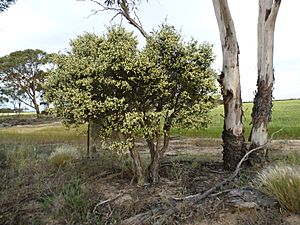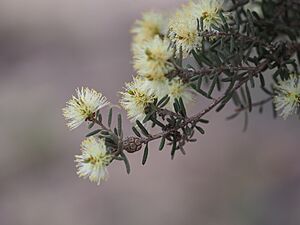Melaleuca brophyi facts for kids
Quick facts for kids Melaleuca brophyi |
|
|---|---|
 |
|
| M. brophyi near Salmon Gums | |
| Scientific classification |
|
| Kingdom: | Plantae |
| Clade: | Tracheophytes |
| Clade: | Angiosperms |
| Clade: | Eudicots |
| Clade: | Rosids |
| Order: | Myrtales |
| Family: | Myrtaceae |
| Genus: | Melaleuca |
| Species: |
M. brophyi
|
| Binomial name | |
| Melaleuca brophyi (K.J.Cowley) Craven
|
|
| Script error: The function "autoWithCaption" does not exist. | |
Script error: No such module "Check for conflicting parameters".
Melaleuca brophyi is a type of plant that belongs to the myrtle family, called Myrtaceae. You can only find it naturally in the south-west part of Western Australia. It's a small to medium-sized bush with thick, small leaves. Its fruits grow in round groups that look a bit like tiny soccer balls!
Contents
What Melaleuca Brophyi Looks Like
This plant is a bush that can grow from about 0.3 to 3 meters (1 to 10 feet) tall. Its leaves are packed closely together and grow in a spiral shape. They are thick, a bit bumpy, and almost round when you look at them from the side. These leaves also have clear oil glands. Each leaf is about 5 to 16 millimeters (0.2 to 0.6 inches) long.
Flowers and Fruit
Small, yellow, round groups of flowers appear on the ends of the branches. These flower groups are about 14 millimeters (0.5 inches) across. You can see them blooming between June and November. Like other melaleuca plants, its flowers have parts called stamens that grow in groups of five. For Melaleuca brophyi, each group has about three to six stamens.
After the flowers, the plant produces woody fruits. These fruits are like small, hard cases called capsules. They grow in small, round clusters, each about 10 millimeters (0.4 inches) wide.
How It Got Its Name
The plant Melaleuca brophyi was first officially described in 1999. A scientist named Lyndley Craven gave it its name. He found a sample of the plant near Lake Biddy on the road to Newdegate.
Meaning of the Name
The second part of its name, brophyi, is a special way to honor someone. It recognizes the important work of Joseph J. Brophy. He studied the natural oils found in plants from the Myrtaceae and Rutaceae families.
Where Melaleuca Brophyi Lives
You can find this melaleuca plant in Western Australia. It grows in the areas between Southern Cross, Norseman, and Esperance. These areas are known as the Avon Wheatbelt, Esperance Plains, and Mallee regions. It likes to grow in black clay soil in low-lying areas that can be a bit salty.
Conservation Status
The Government of Western Australia Department of Parks and Wildlife has looked at Melaleuca brophyi. They have classified it as "not threatened." This means the plant is not currently in danger of disappearing.
 | Chris Smalls |
 | Fred Hampton |
 | Ralph Abernathy |


